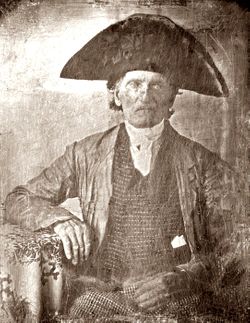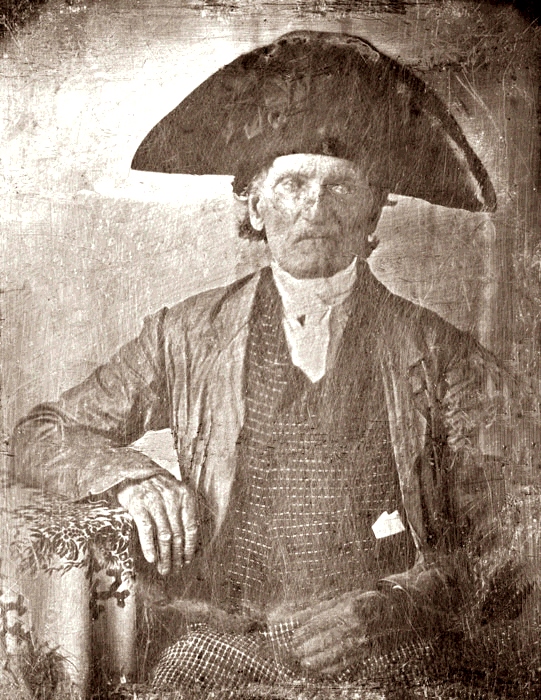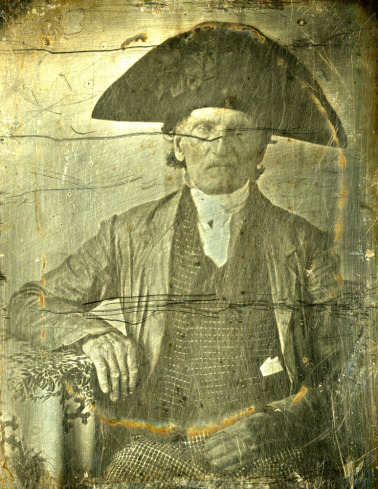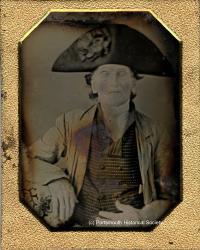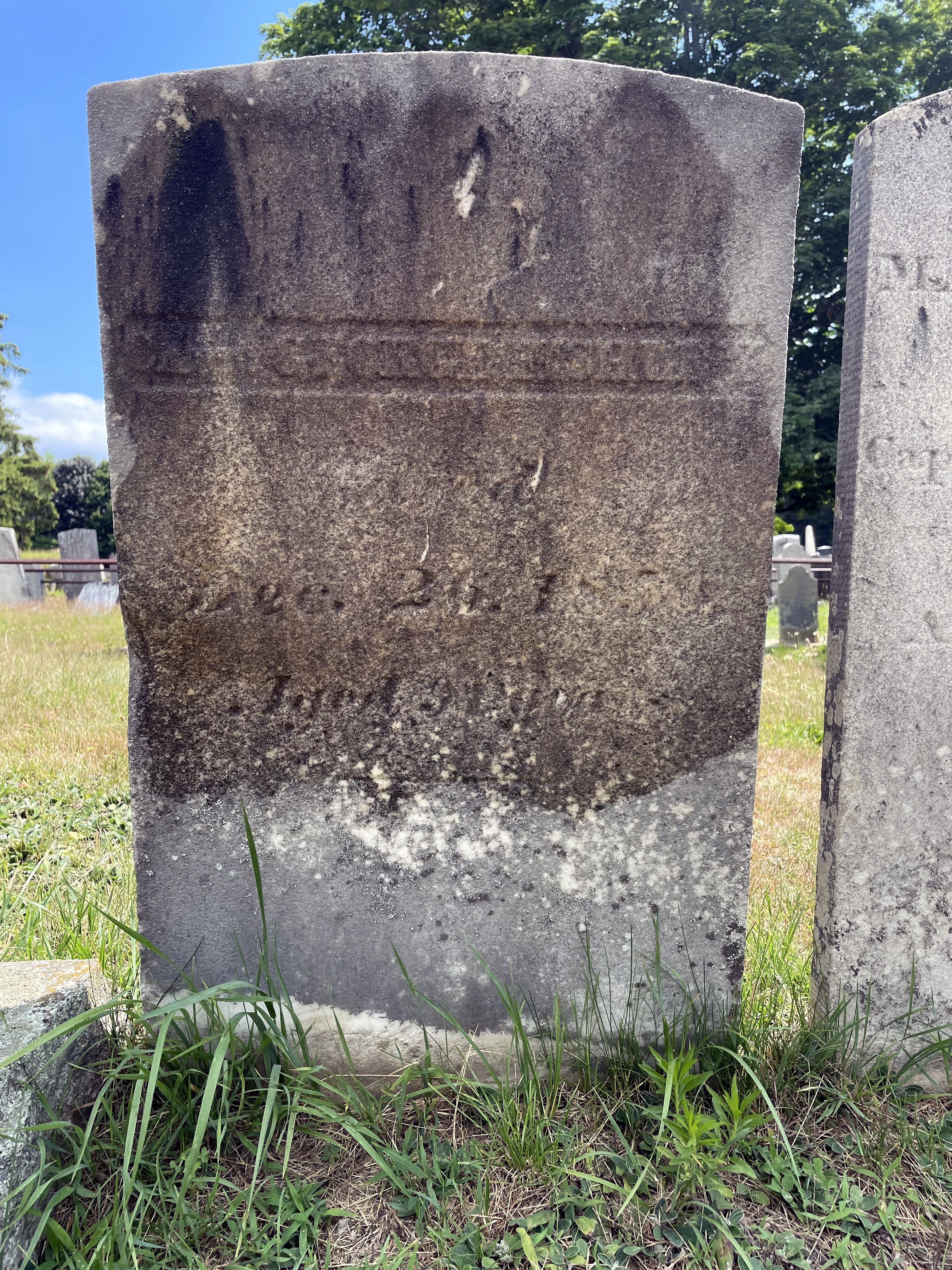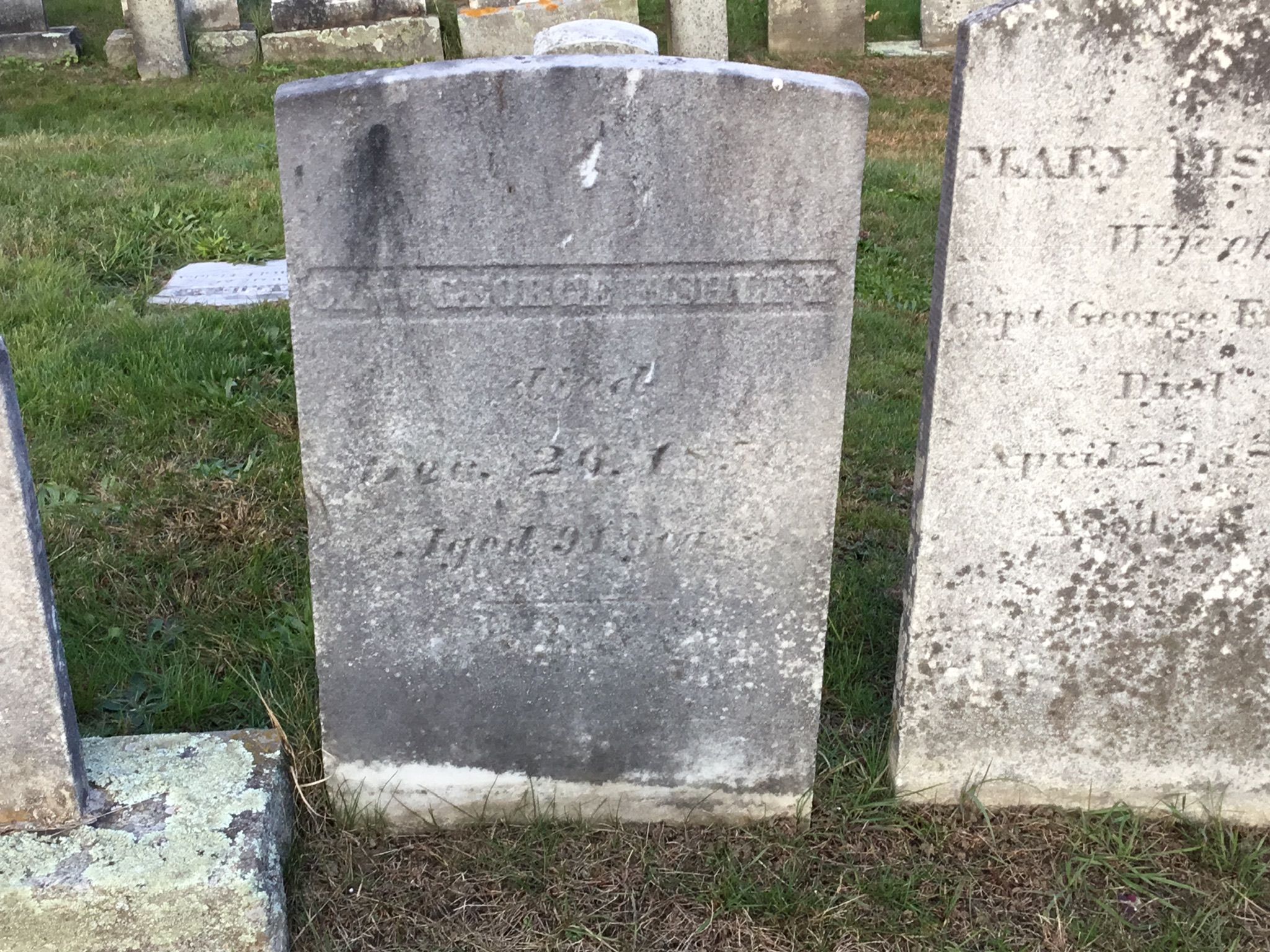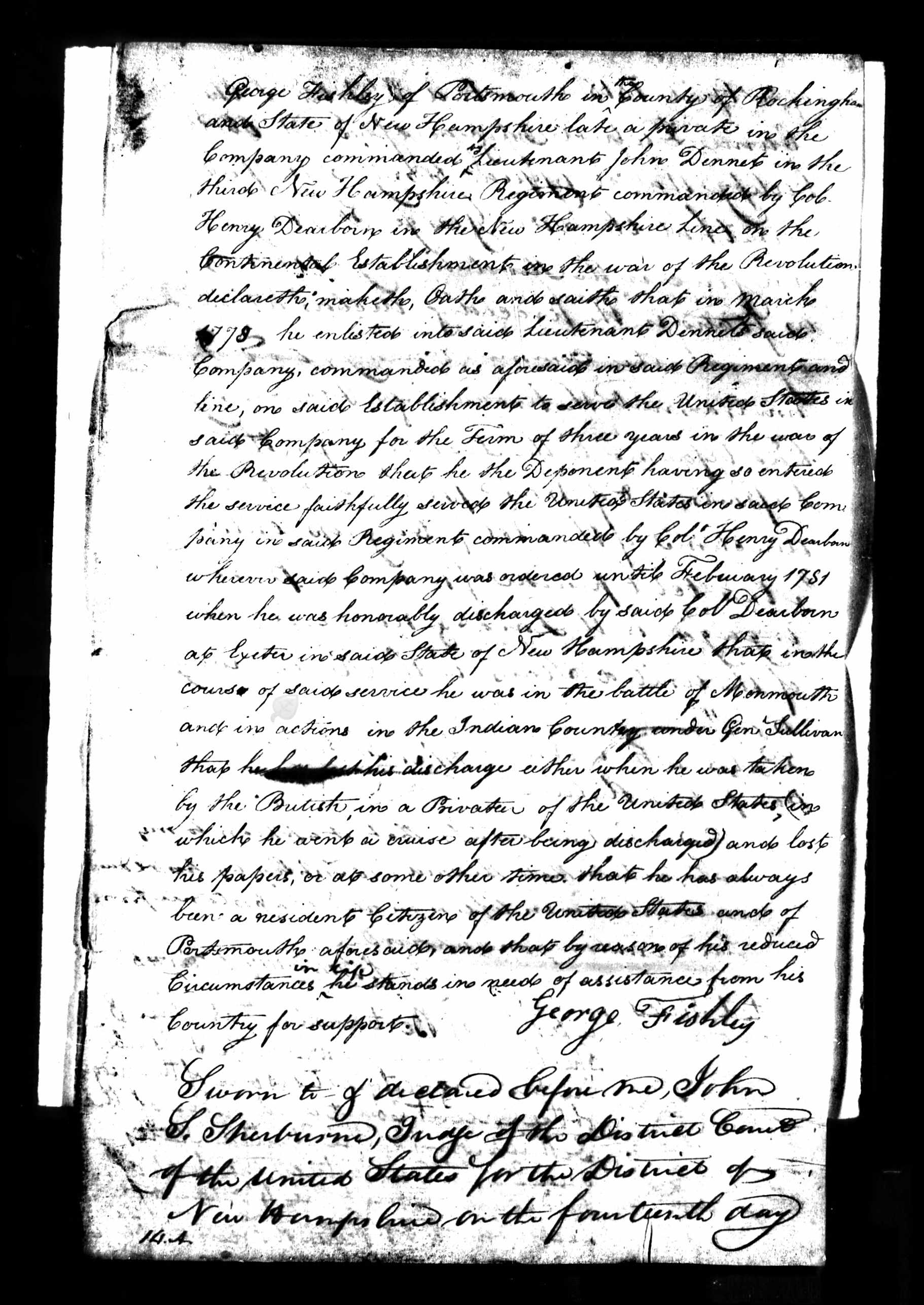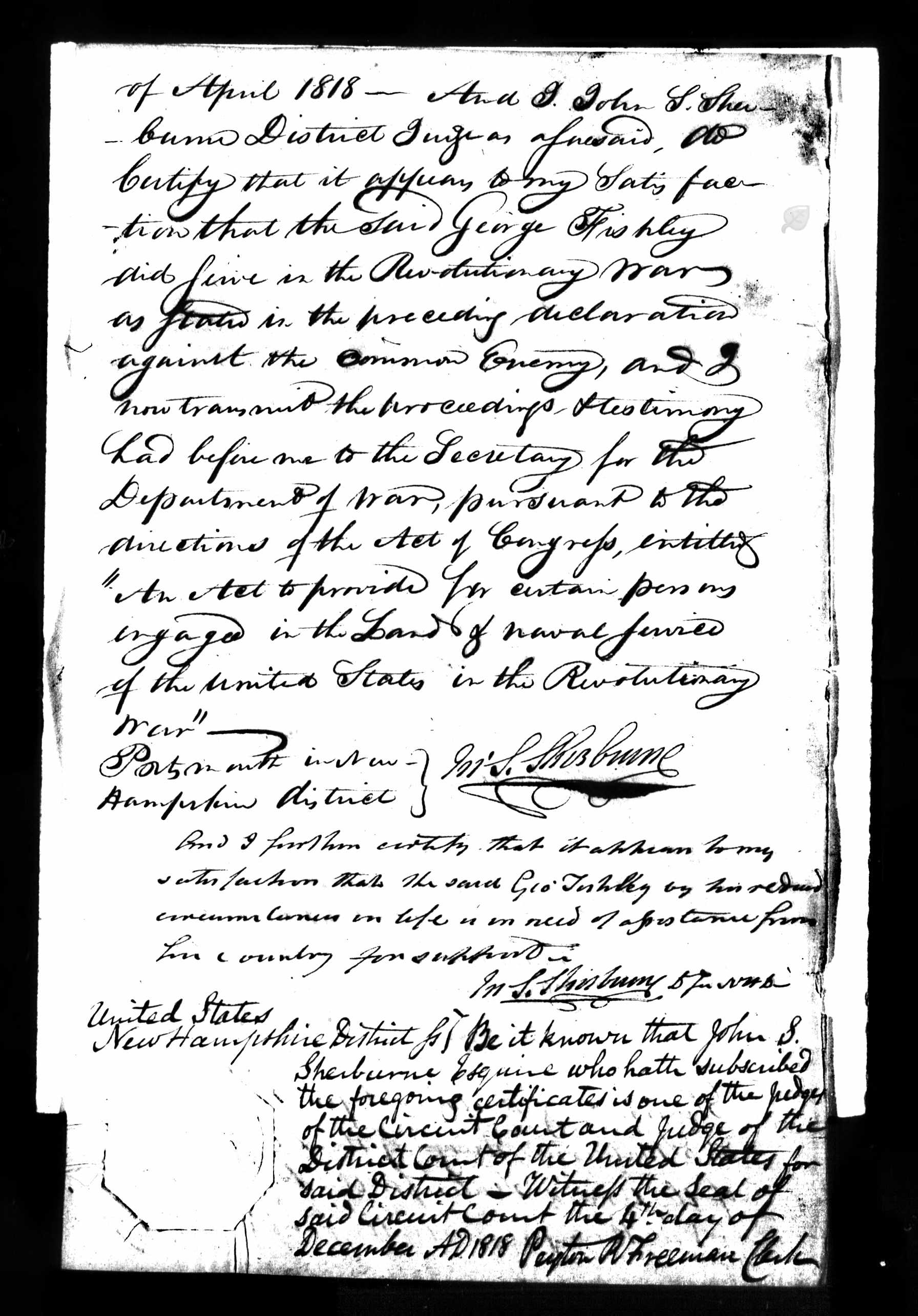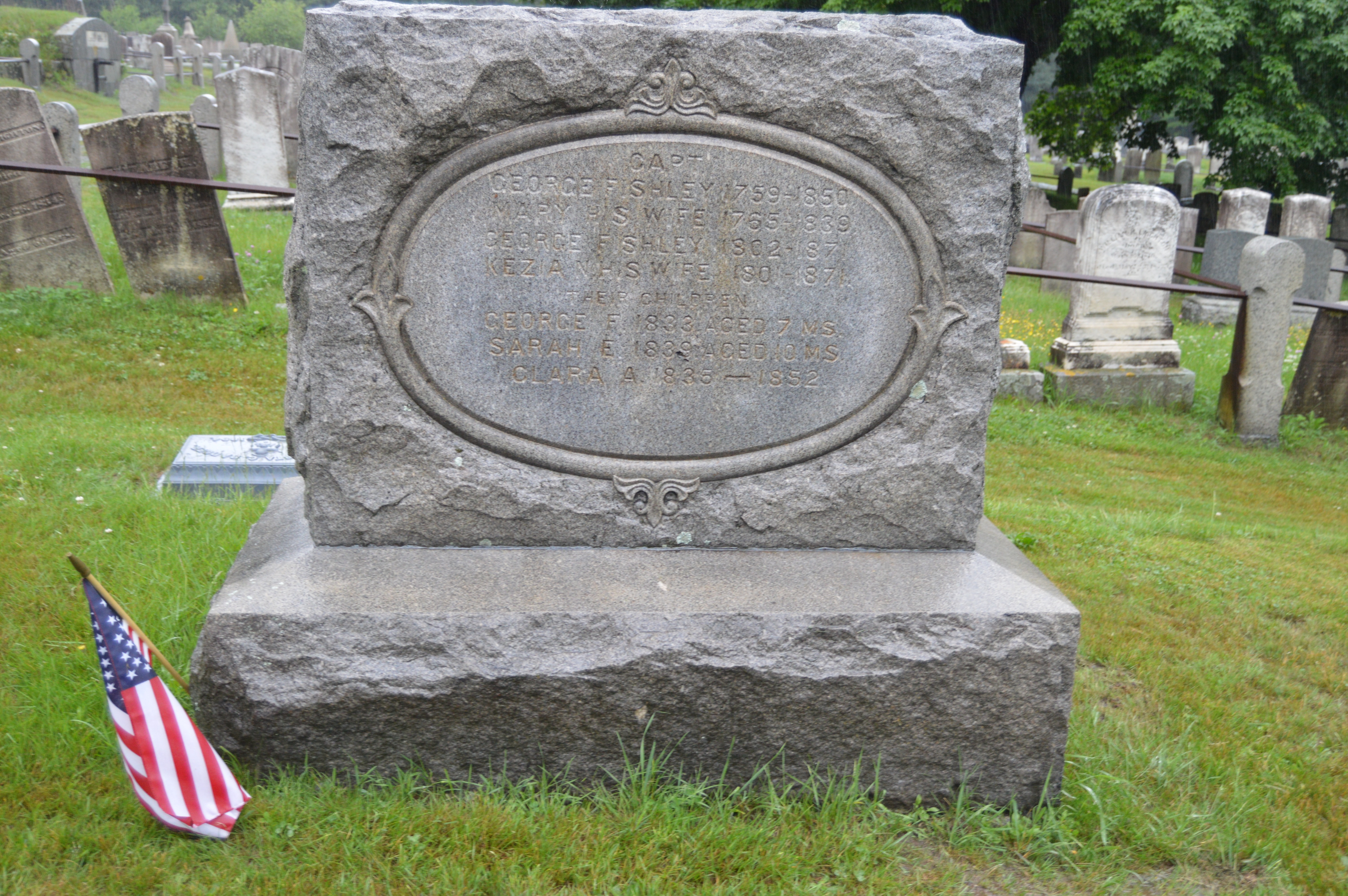DEATHS.
Dec. 26, Capt. GEORGE FISHLEY, aged 90 years and 6 mos. Funeral on Sunday afternoon from St. John's Church, immediately after the close of the afternoon service.
Capt. F. was engaged, during the Revolution, in the service of his country, both upon sea and land. He has long been well-known amongst us as a firm patriot and an excellent citizen, and his death will be lamented. Thus one after another the veterans who participated in the struggle for our independence are passing away. [Mortuary Notice, Page 3]
His obituary from the 4 January 1851 edition of The Portsmouth Journal of Literature and Politics:
CAPT. GEORGE FISHLEY.
We gave in our paper last week a short obituary of this venerable citizen, who died in this city on the 26th of December, in his 91st year. Mr. Fishley possessed to the last years of his life, most of his faculties to a remarkable degree. For many years he has on public occasions appeared conspicuously in the processions, in a cocked-hat which almost vied in years with the wearer. He was born on the 17th day of June, 1760. At the age of seventeen he entered the continental army, under Gen. Poor and Col. Dearborn. In the course of the three years of his service he was at the battle of Monmouth, (in which action General Washington commanded the American and Sir Henry Clinton the British forces,) at the execution of Maj. Andre, and in the various positions the army occupied in that time. As an instance of revolutionary service, he related that just seventy-three years ago last Tuesday, he marched with his companions in arms, several miles, in the vicinity of Valley Forge, without shoes or stockings.—After leaving the land service, he embarked in a privateer on the ocean—was captured, and held as a prisoner at Halifax.
His after life was spent mostly in trading—for many years he had command of a coaster between Portsmouth and Boston—and when by the just provision of a grateful country pensions were granted to the soldiers of the revolution, he became a recipient of that bounty, and was enabled thereby to descend in comfort to the grave.
In political feelings he was strongly Whig—so much so that when President Polk visited Portsmouth a few years since, he said he declined at first shaking hands with him, because he had no political sympathies with him. In 1840, when the great gathering of the Whigs of New Hampshire was made at Concord, a company of about 300 citizens went from Portsmouth. As an emblem of commerce, a miniature ship was rigged, and was drawn from our wharves to the political capital of the State. The commander of this vessel, which will long be remembered, was Capt. Fishley.
In 1843 he celebrated his birthday, the 17th of June, in the great meeting on Bunker Hill. He was among those few Revolutionary soldiers who were companions on the occasion. Incorporated in his very existence was the spirit of '76—and on all fitting occasions it was prominently visible. With him the last of our cocked hats has departed. He was an amiable man, a good citizen, and beloved by all who knew him.
He was buried from St. John's church on Tuesday last—the Portsmouth City Greys doing the last military honors to the old Patriot. [Obituary Page 2]
A funny tidbit: It is told of Fishley that when Adams and Jefferson were buried in 1826, and a procession was contemplated in Portsmouth, of which the Revolutionary heroes were to form a part, the committee came to Fishley requesting him to appear. He asked who were to be there. All were named until ----- was mentioned. "What" cried the old man. "He a patriot!" Why he was a damn Hessian, and came over here to fight us for six pence a day. No s-i-r, I don’t ride with such patriots as he!" And ride he did not on the solemn occasion.
Biography: George Fishley, entered the Continental Army in 1777, under Gen. Poor and Col. Dearborn. He served three years and was among the men who marched near Valley Forge wearing no shoes or stockings. He was at Monmouth, the New Jersey confrontation led by George Washington. After the Revolution, he served aboard a privateer, was captured and imprisoned in Halifax. He later commanded a coaster shipping between Portsmouth and Boston. He was one of the few surviving veterans to attend the opening of the Bunker Hill Monument in Boston in 1843. He commanded a miniature ship that was transported from Portsmouth inland to Concord, NH. He was among the three longest-surviving Revolutionary War veterans in Portsmouth, NH. He was among hundreds of elderly New England pensioners who applied to an early veteran's relief program sponsored by the federal government in 1840. (Biography submitted by: Helen L. Smith Hoke)
DEATHS.
Dec. 26, Capt. GEORGE FISHLEY, aged 90 years and 6 mos. Funeral on Sunday afternoon from St. John's Church, immediately after the close of the afternoon service.
Capt. F. was engaged, during the Revolution, in the service of his country, both upon sea and land. He has long been well-known amongst us as a firm patriot and an excellent citizen, and his death will be lamented. Thus one after another the veterans who participated in the struggle for our independence are passing away. [Mortuary Notice, Page 3]
His obituary from the 4 January 1851 edition of The Portsmouth Journal of Literature and Politics:
CAPT. GEORGE FISHLEY.
We gave in our paper last week a short obituary of this venerable citizen, who died in this city on the 26th of December, in his 91st year. Mr. Fishley possessed to the last years of his life, most of his faculties to a remarkable degree. For many years he has on public occasions appeared conspicuously in the processions, in a cocked-hat which almost vied in years with the wearer. He was born on the 17th day of June, 1760. At the age of seventeen he entered the continental army, under Gen. Poor and Col. Dearborn. In the course of the three years of his service he was at the battle of Monmouth, (in which action General Washington commanded the American and Sir Henry Clinton the British forces,) at the execution of Maj. Andre, and in the various positions the army occupied in that time. As an instance of revolutionary service, he related that just seventy-three years ago last Tuesday, he marched with his companions in arms, several miles, in the vicinity of Valley Forge, without shoes or stockings.—After leaving the land service, he embarked in a privateer on the ocean—was captured, and held as a prisoner at Halifax.
His after life was spent mostly in trading—for many years he had command of a coaster between Portsmouth and Boston—and when by the just provision of a grateful country pensions were granted to the soldiers of the revolution, he became a recipient of that bounty, and was enabled thereby to descend in comfort to the grave.
In political feelings he was strongly Whig—so much so that when President Polk visited Portsmouth a few years since, he said he declined at first shaking hands with him, because he had no political sympathies with him. In 1840, when the great gathering of the Whigs of New Hampshire was made at Concord, a company of about 300 citizens went from Portsmouth. As an emblem of commerce, a miniature ship was rigged, and was drawn from our wharves to the political capital of the State. The commander of this vessel, which will long be remembered, was Capt. Fishley.
In 1843 he celebrated his birthday, the 17th of June, in the great meeting on Bunker Hill. He was among those few Revolutionary soldiers who were companions on the occasion. Incorporated in his very existence was the spirit of '76—and on all fitting occasions it was prominently visible. With him the last of our cocked hats has departed. He was an amiable man, a good citizen, and beloved by all who knew him.
He was buried from St. John's church on Tuesday last—the Portsmouth City Greys doing the last military honors to the old Patriot. [Obituary Page 2]
A funny tidbit: It is told of Fishley that when Adams and Jefferson were buried in 1826, and a procession was contemplated in Portsmouth, of which the Revolutionary heroes were to form a part, the committee came to Fishley requesting him to appear. He asked who were to be there. All were named until ----- was mentioned. "What" cried the old man. "He a patriot!" Why he was a damn Hessian, and came over here to fight us for six pence a day. No s-i-r, I don’t ride with such patriots as he!" And ride he did not on the solemn occasion.
Biography: George Fishley, entered the Continental Army in 1777, under Gen. Poor and Col. Dearborn. He served three years and was among the men who marched near Valley Forge wearing no shoes or stockings. He was at Monmouth, the New Jersey confrontation led by George Washington. After the Revolution, he served aboard a privateer, was captured and imprisoned in Halifax. He later commanded a coaster shipping between Portsmouth and Boston. He was one of the few surviving veterans to attend the opening of the Bunker Hill Monument in Boston in 1843. He commanded a miniature ship that was transported from Portsmouth inland to Concord, NH. He was among the three longest-surviving Revolutionary War veterans in Portsmouth, NH. He was among hundreds of elderly New England pensioners who applied to an early veteran's relief program sponsored by the federal government in 1840. (Biography submitted by: Helen L. Smith Hoke)
Inscription
CAPT.
GEORGE FISHLEY 1759-1850.
MARY HIS WIFE 1765-1839.
